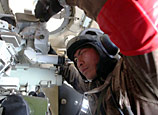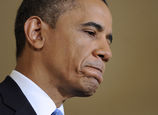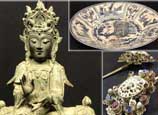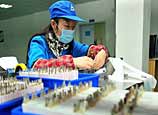
CAIRO, Jan. 22 (Xinhua) -- The recent medicine price hikes in Egypt and the disappearance of many types of medicine in the Egyptian markets have created a debate in the turmoil-striken country, adding more concerns to Egyptians who are already suffering lack of adequate health care services.
In a lot of pharmacies nationwide, particularly in impoverished areas, many unhappy visitors return empty-handed as they fail to find the medicines they usually use or prescribed by physicians.
"Most of the medicines are not available in pharmacies. I usually buy Otrivin drops and Hero Baby Milk for my baby, but they are missing in the market nowadays," Hanaa Tharwat, a 36-year-old mother, told Xinhua in a pharmacy at Boulak al-Dakrour neighborhood in Giza.
Assistant doctor Marwa Abdel-Qadir told Xinhua that there were medicines whose prices doubled, and they were not even available.
"Some rheumatism shots, which should be regularly used by patients from childhood until the age of 21, disappeared. Necessary types of milk powder are also unavailable. The Urivin eff sachets are missing in the market for almost six months, so the people are fed up," she said.
While some physicians and chemists see the increase of some medicine prices fair, calling the health ministry to approve some hikes, others believe pharmaceutical companies care only about profits, even at the expense of the poor.
"Pharmaceutical companies suffer great losses. There are some 20-tablet packs sold for less than half a U.S. dollar. The Prisoline eye and nasal drop bottle is sold for half a dollar, which is 50 percent of the cost of the empty plastic bottle," Medhat Saad, a chemist, said.
In contrast, pharmacy owner Galal al-Shaf'ie told Xinhua that pharmaceutical companies did not lose money, but they just wanted to make more money.
"They claim the expensive imported material besides the U.S. dollar appreciation made them suffer losses. The health ministry should see whether they really lose money or not, and it should accordingly consider approving reasonable price hikes so that the market goes on," he recommended.
Egypt is currently suffering a financial hardship after two years of political chaos and turmoil that tremendously reflected on its economy. The country is challenging a sharp budget deficit, in addition to an alarming level of foreign currency reserves, falling from 36 billion U.S. dollars in January 2011 to about 15 billion dollars at the end of December 2012.
As a result, Egyptian pound greatly plummeted against U.S. dollar, with one dollar sold for over 6.63 pounds as of Tuesday, recording one of the highest rate in 10 years. Therefore, pharmaceutical companies, particularly regional and multinational ones, argue that the worldwide rising prices of drug material, which is imported with U.S. dollar, forced them to either raise prices of some medicines or stop their production.
"Pharmaceutical companies get very expensive imported material to produce high quality medicine. That is why their prices are higher than those of local companies," Yahya Nabil, head of medical sector at MSD pharmaceutical company, told Xinhua.
Nabil explained that a multinational company may spend more than 800 million dollars, study 500 to 700 chemical compounds, dedicate experts and spend four to seven years "to produce a single type of medicine," calling for a middle-ground between the government and the pharmaceutical companies to resolve the issue of medicine price hike.
"If the price of a certain type of medicine increases by 30 percent, I recommend the health ministry to pay it so that the price remains the same for the citizen and the company gets a fair price," Nabil suggested, noting that discussions between his company and the health ministry were still going on.
On the other hand, the health ministry's spokesman for pharmaceutical sector, Youssef Talaat, said the ministry would not want to cause pharmaceutical companies any losses, affirming that the government was studying a plan to provide companies that refrained from producing life-rescuing medicines with facilitation and incentives to provide sufficient, safe and affordable medicine for citizens.
"The government's subsidies for medicine were less than 17 million U.S. dollars, while our pharmaceutical trade exceeds 8 billion U.S. dollars," Talaat admitted.
He revealed to Xinhua that the health ministry was trying to increase its share from the country's general budget to 15 percent instead of 4.8 percent, noting that 35 percent of the ministry's share would go to medicine subsidies.
Not all public hospitals in Egypt suffer from the shortage of medicine, as the warehouse of the well-known Giza's Umm al- Masriyeen Hospital has enough medicine for six months to come, according to hospital manager Abdel-Rahman al-Mahdi.
"We do not have shortage of necessary medicine needed for emergency, anaesthetization, hypertension, diabetes and such chronic diseases. The unavailable types of medicine also have cheaper alternatives. The medicine price hikes is not as fatal as depicted, as the price of some types of medicine is less than half a U.S. dollar if doubled," al-Mahdi told Xinhua.
He added that the health ministry provided Umm al-Masriyeen Hospital with around 750,000 U.S. dollars for medicine subsidies, noting that some public hospitals were suffering from medicine shortage either because they were smaller so they got smaller amounts or because of maladministration.
Some pharmaceutical experts believe the medicine prices in Egypt are fair compared to other countries worldwide, illustrating that 51 percent of medicine in Egypt is sold for less than 1.5 dollars. However, others view that it is all about business and money for pharmaceutical companies regardless of the right of the poor to get a high-quality medicine at a reasonable price.
















 Beijing style: Duck, opera, fog and cough...
Beijing style: Duck, opera, fog and cough...


![]()
